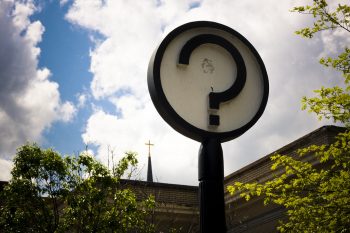Mother’s cookie, children’s heads and other silly words in Dutch Posted by Karoly Molina on Aug 28, 2019 in Dutch Vocabulary
Those who speak Dutch have a funny habit of stacking words together, creating very long and sometimes confusing for learners. These be as simple as kortingkaart (discount card), hondenbelasting (dog tax), and verkeersboete (traffic fine). Unfortunately, there are other words that might seem are part of these compounding nouns and make you wonder what the heck could they possible mean. Below is a list of some of my most recent discoveries.
Moederkoek
Not too long ago, I was at someone’s birthday celebration in the inevitable circle of conversation that ensues in these type of events. I cannot remember what the conversation was about, but I do remember the word moederkoek came up, and I was dumbfounded. What could this possible mean? I asked the husband what this funny sounding word meant, and he proceeded to translate the word literally: mother’s cookie. Ugh? This conversation is clearly not about food; how could a mother’s cookie be relevant?
Fortunately, another person overheard and explained that moederkoek was all the blood and “stuff” that came when a baby was born: the placenta. We all laughed. While anyone could argue that there is some sort of symbolism behind calling the placenta a mother’s cookie because yes, it is integral in keeping the baby alive, it turned out to be one of those words that sounds like a compoundable noun but isn’t.
It seems that I am not the only one confused by this word. In the following video, a few people are asked what is one of the ingredients of moederkoek and what is a moederkoek and the answers are very funny!
https://youtu.be/fpmWfvF6Noo?t=336
Moedervlekken
Another word related to mothers that did not make sense at first is moedervlekken. Literally translated, moedervlekken means mother stains, but what can that possibly be? Birthmarks.
It seems that in the Netherlands, these spots most of us are born with are the responsibility of our mothers. While it would seem reasonable to blame our mothers for this since we come to form inside their womb, moedervlekken come from our DNA. The video below explains more.
Kinderkopje
Steering away from mother-related words, kinderkopje is perhaps the weirdest one in this bunch. Kinderkopjes does not really refer to children’s heads, but rather are a type of paving stone. The name makes reference to the size; these stones are the size of a kid’s head.
If you have visited the Netherlands, you have certainly stepped on plenty of kinderkopjes. Most cities use these in the city centre and, while they do suffer their wear and tear, the durable material means that they last a long time. Unfortunately, kinderkopjes are not the best option for people with mobility issues, strollers and people wearing heels. In the following video, you can see the type of problems kinderkopjes give.
Ezelsbruggetje
This is the latest funny word I learned. Ezelsbruggetje literally means a donkey’s little bridge, however, it has nothing to do with donkeys or bridges. An ezelsbruggetje is a a mnemonic or memory device. A very simple example is when you don’t know which one is your left side, and you check which hand can make a correct L shape with the thumb and index finger.
One example of a language ezelsbruggetje is ‘t Kofschip for the past tense. When you are not sure if a verb needs a d or a t at the end in the past tense, you first remove the -en ending. Then you check the last letter and sound of that word. If it is one of the letters or sounds in ‘t Kofschip, then you add a t at the end. If it isn’t, a d. For example, gebeuren or to happen. When you remove the -en ending, you are left with gebeur. There is no r in ‘t Kofschip therefore, the past tense has a d at the end: gebeurde/gebeurd.
The following video has another ezelsbruggetje, this time for the present tense.
Which other Dutch words would you add to this list?

Build vocabulary, practice pronunciation, and more with Transparent Language Online. Available anytime, anywhere, on any device.




